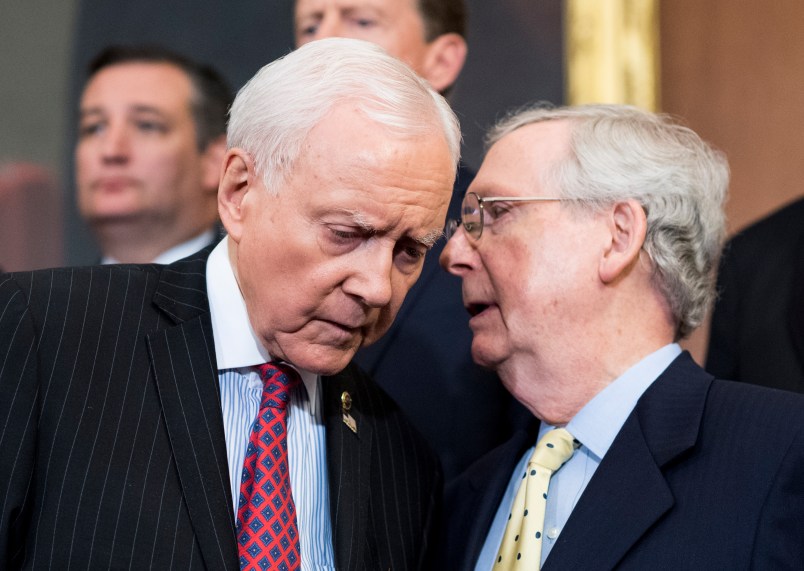On Thursday afternoon, Senate Minority Leader Chuck Schumer (D-NY) announced that every single Senate Democrat would back a bipartisan bill to restore the subsidy payments to health insurance companies defunded by President Trump. Combined with the 12 GOP senators who officially co-sponsored the bill, that gives the measure a filibuster-proof supermajority if and when it comes to the floor for a vote.
But with a powerful committee chairman and several other lawmakers in staunch opposition, hostility to the bill radiating from the House of Representatives, right-wing advocacy groups mobilizing against it, and a President who appears to hourly change his mind on the policy, there is no guarantee the bill will pass.
The list of Republican co-sponsors of the bill unveiled on Thursday includes half a dozen committee chairs, making it more difficult for Senate leaders to refuse to hold a vote. But Sen. Orrin Hatch (R-UT), who chairs the Finance Committee that would take up the bill if it goes through the committee process, is not one of them.
“I’m concerned we’re just perpetuating a bad process,” Hatch told TPM. “They want to do it for another two years. I’d rather face the problem now.”
Hatch is referring to the heart of the bill, which provides two years of funding for cost-sharing reduction subsidies to health insurance companies that go towards lowering the cost of care for low-income patients.
Bill co-author Sen. Lamar Alexander (R-TN) told TPM Thursday that if the bill does go through a regular committee markup, an open question at this point, it would go through Hatch’s Finance Committee. Asked if Hatch would commit to holding a hearing and markup on the bill, a GOP aide called the question “premature.”
“He would have to talk to committee members about it to see how they want to move forward,” the aide said.
The aide added that Hatch would only support restoring the CSR funding if the bill goes further in dismantling the Affordable Care Act, including “getting rid of the most unpopular and onerous provisions like the mandates and taxes”—a proposal House Republicans have also floated and one Democrats would certainly reject.
The dozen GOP senators supporting the bill argued Thursday that it would help lower premiums, save taxpayer money, and pave the road to full repeal later on.
“It’s just a placeholder until we can repeal Obamacare next year,” Graham told reporters, echoing a popular Republican talking point about the measure.
But other lawmakers joined Hatch in expressing anxiety about enacting anything that props up Obamacare’s individual market, even temporarily.
“I don’t want to put paint on rotten wood,” Sen. John Kennedy (R-LA) told TPM. “I want to see that this is going to actually help as opposed to just throwing money at the problem.”
Kennedy, Hatch and a handful of other senators also echoed views voiced by Trump and outside conservative groups portraying the subsidies as a “bailout” for insurance companies, despite the fact that the companies are required by law to use the money to lower the premiums and deductibles of low-income patients.
“We’ve built into this very clear language that this is a pass-through and has to be expended in the appropriate fashion,” Sen. Mike Rounds (R-SD), one of the dozen GOP co-sponsors, explained. “As an additional safeguard, we’ve actually included the insurance commissioners as part of the review process.”
“But it doesn’t matter what we think,” he acknowledged. “It’s a matter of making sure the President is comfortable with it. And if the President feels we have to do something else, we’re more than comfortable working with the White House on it.”
Other Republicans backing the bill, as well as Democrats, also noted they are open to making tweaks to appease President Trump.
“If there are ways to do even more to make sure patients come first and insurers can’t pad their profits, I’m certainly open to those,” bill co-author Patty Murray (D-WA) said Thursday, adding in a swipe at the bill’s critics: “I absolutely disregard anyone who says this is a bailout for insurers. It’s clear they haven’t read the bill.”







These chicken Repubs are still running scared of Trump’s A-hole Nation—a bunch so low that they still support Dear Leader just out of spite for being such a-holes to foist him on the country.
Here’s a short blog explaining how A-hole Nation must be beaten back:
Enjoy!
Exactly. They already appear eager to do everything within their power to lose control of the House and, some are speculating, the Senate, as well.
They’ll pick up the needed Rethug votes because they are going into Self-preservation Mode.
You have to spend money to make money.
But go ahead. Let Trumpcare continue, and watch your “beautiful” economy come crashing down.
It’s a pretty good bill. It will help regular, non-super-rich Americans. Democrats will vote for it. Republicans control Congress and the presidency. It will not pass and become law.
I’m assuming that this bill is only good for this Congress, so while I agree with you that the insurance companies will succeed in getting the markets stabilized, it might take until after the first of the year. That would be soon enough for GOP to stay clear of the election, and Trump might be gone or on his way out.
I’m still guessing that Trump will be negotiating his exit in December. If that’s so, everything will be on hold.
The way things are now in our current tenth Smash Week of the lomng-running kabuki melodrama “Waiting for Mueller”